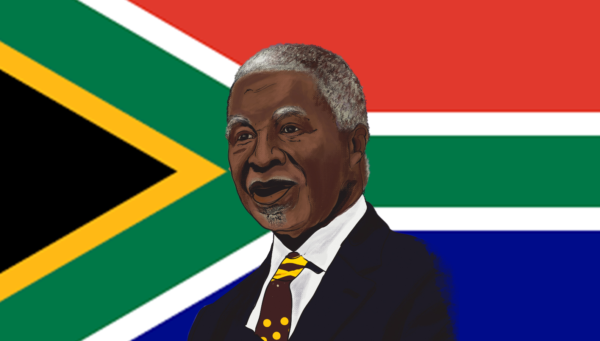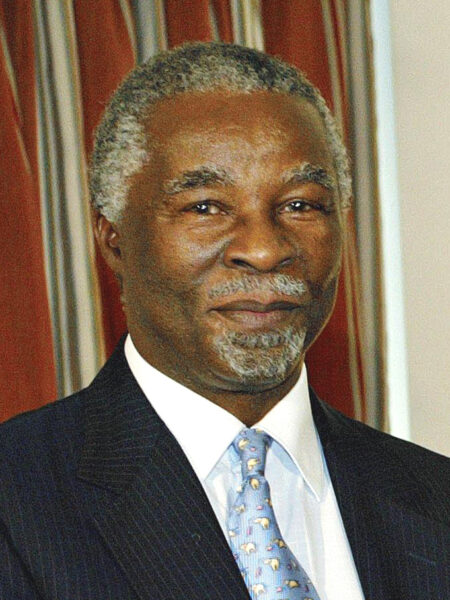By Toyin Falola
Sports provide an atmosphere to test a lot of things, the zenith of which is people’s resolve and determination to make an impact through activities that are not governed by aesthetics or influenced by one’s status. Every activity in life often requires a considerable amount of influence, which someone can pull to achieve preconceived results. However, sports usually do not operate this way, as their results are a true reflection of the efforts that people in the competition have made. For this reason, a sport serves as a measure of a person’s true ability, their can-do spirit, and their determination to accomplish their set goals without waiting for others.

Thabo Mbeki understands a lot about the relationship between sports and the construction of a great society, which is why he always gives accolades to those who participate in one form of sporting activity or another. For South Africans, the idea of participating in sports competitions is not merely about the competition itself but rather about how the activities reflect other things that are infinitely connected to the sociopolitical trends set and sustained in an environment with a history of political divisions, cultural disparity, and ideological quandary. As a result, South Africans are more concerned about how sports serve as a tool for social integration and egalitarian principles, which are crucial to the actualization of their collective aspirations. Of course, South Africans have participated in a number of sports competitions, with many of them demonstrating incredible talents and fostering a sense of national pride.
This highlights the connection between sports and the construction of an egalitarian society. For a country like South Africa, it is evident that they must immediately move beyond the politics of division and vendetta, which stem from the acrimonious tensions and strives that characterized the apartheid era. Although they were emerging from the claws of apartheid and totalitarian forces that fostered segregation, sectionalism, and division, they needed to rise beyond pedestrian politics by creating an organic country focused on what unites them rather than what divides them. A very unpopular reaction would have been that they either discontinue the imbalanced structures they inherited, ultimately provoking continued discrimination that favors those at the helm of political power and oppressing the less privileged. However, this approach would further create problems for political leaders, as each new leadership would likely engage in more acrimonious political undertakings that would lead to even graver challenges for the people.

It is against such imagination that Mbeki recognizes sports as an instrument of conflict resolution and management. By encouraging non-racist participation in sports, he aimed to promote common interests and unity among South Africans. While they needed to protect the culture of non-racist sociopolitical trends and traditions, it was also important that they considered a number of traditional sporting activities. This is because conventional sports allow people to blend their capacity with what their peers can do in the field of play; however, it is also necessary to provide an atmosphere for people to engage in sports that are more familiar and culturally relevant to them. Apart from being cost-effective, this approach also helps to create an environment where more people can participate.
Although many of these sporting activities are not typically included in the Olympic Games, they could potentially be considered if they demonstrate how critical they are to sports generally. Conventional sporting activities include events where people living with disabilities can showcase their skills and be recognized as candidates to watch out for in their respective fields. Still, it is important to note that if the net of participation is cast wider to include non-conventional sports associated with various Indigenous societies, the issue of participation will become more open as partakers rise geometrically. The push for the inclusion of many indigenous sports activities is aimed at evolving a practice that deepens and broadens the diversity and richness of sports as a whole.
The significance of traditional sports is manifested in how they help facilitate the development of a unique and powerful identity carved from their history and cultural science. With globalization, the influence of other people’s cultures is easily noticed, especially in how different groups conduct themselves and conform to broader societal norms. While participation in traditional sports automatically solves the issue of access, it is baffling that many African countries lack the opportunity to showcase the cultural resources for which they are historically known. In essence, the quest for traditional sports is geared towards the actualization of a unique identity that can be recognized in the global sports economy. This ambition must be pursued relentlessly, as it holds the power to recalibrate the world’s perception of Africa by integrating its traditional practices into global engagements.

Beyond presenting the opportunity for the world to understand the nuances of the African culture, the advocacy for such engagement is expected to encourage people to reconnect with their roots so that they can be familiar with their environment and integrate themselves into it. Sports provide this opportunity by not only allowing access to cultural resources but also immersing individuals in their own cultural identity–a necessity for South Africans for many reasons.
To have invested in such a dream, Mbeki is aware that South Africa is at risk of cultural genocide because people have been conditioned to only some specific types of culture through prolonged exposure. The fear is that as long as they continue to accommodate cultural expressions that are not originally theirs, the likelihood of erasing their cultural identity remains very strong. Therefore, they must combat such possibilities from the early stages by addressing the issue of cultural abandonment that had plagued the nation in the past.
Mbeki understands that while people may believe that sports do not put them in the wrong spot where cultural erosion is possible, the subtle and overlooked aspects of cultural erosion can have a profound impact on their engagements and realities. To that extent, it is understandable that sporting activities can obliterate a people’s historical resources, especially when they are not immersed in their traditional practices. As a result, the push for integrating traditional sports seeks to achieve a dual purpose of creating a healthy atmosphere for competition while also helping to protect cultural resources. A culture that has endured centuries-long division and maltreatment may as well become vulnerable when it removes itself completely from the activities and events that sustain its identity.

South Africa is a country with diverse historical and cultural heritages, rich in content and numerous in scope. It is, therefore, necessary to prioritize and elevate this diversity, giving it a platform to rise. While South Africans’ participation in conventional sports has led to the absorption of other cultural frames–which is not a bad idea–the assimilation of foreign cultures at the detriment of their own poses significant challenges. This exposure not only weakens their cultural identity but also puts them at risk of rendering their future generations powerless in the scheme of things.
Mbeki recognized the importance of stamping out every possibility of cultural imperialism and totalitarianism by encouraging activities that promote fairness and justice in all aspects of life. This explains his rapid transformation of society through the projection of ideas and implementation of policies that are rejuvenating and restorative. In contemporary South African history, the people are composed of heterogeneous cultures, and it is critical that they use this as a weapon to strengthen themselves by accepting their differences and understanding that each culture offers valuable contributions to the collective system.
PS: This is a 12-part series based on the collections edited by Sifiso Mxolisi Ndlovu, titled ANC Today Letters: The Ideas and Thoughts of President Thabo Mbeki, Volume 1, 2001-2004, supplemented by materials in the Thabo Mbeki Museum, UNISA, Pretoria. The series is composed over five weeks in three different countries. The museum’s resources, digitized under 27 categories, can generate over 200 books.
